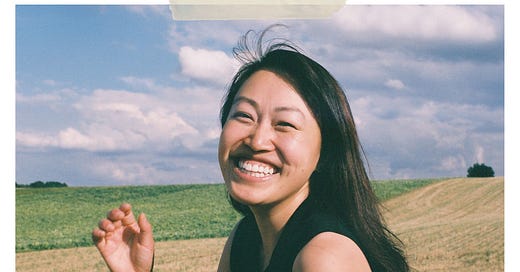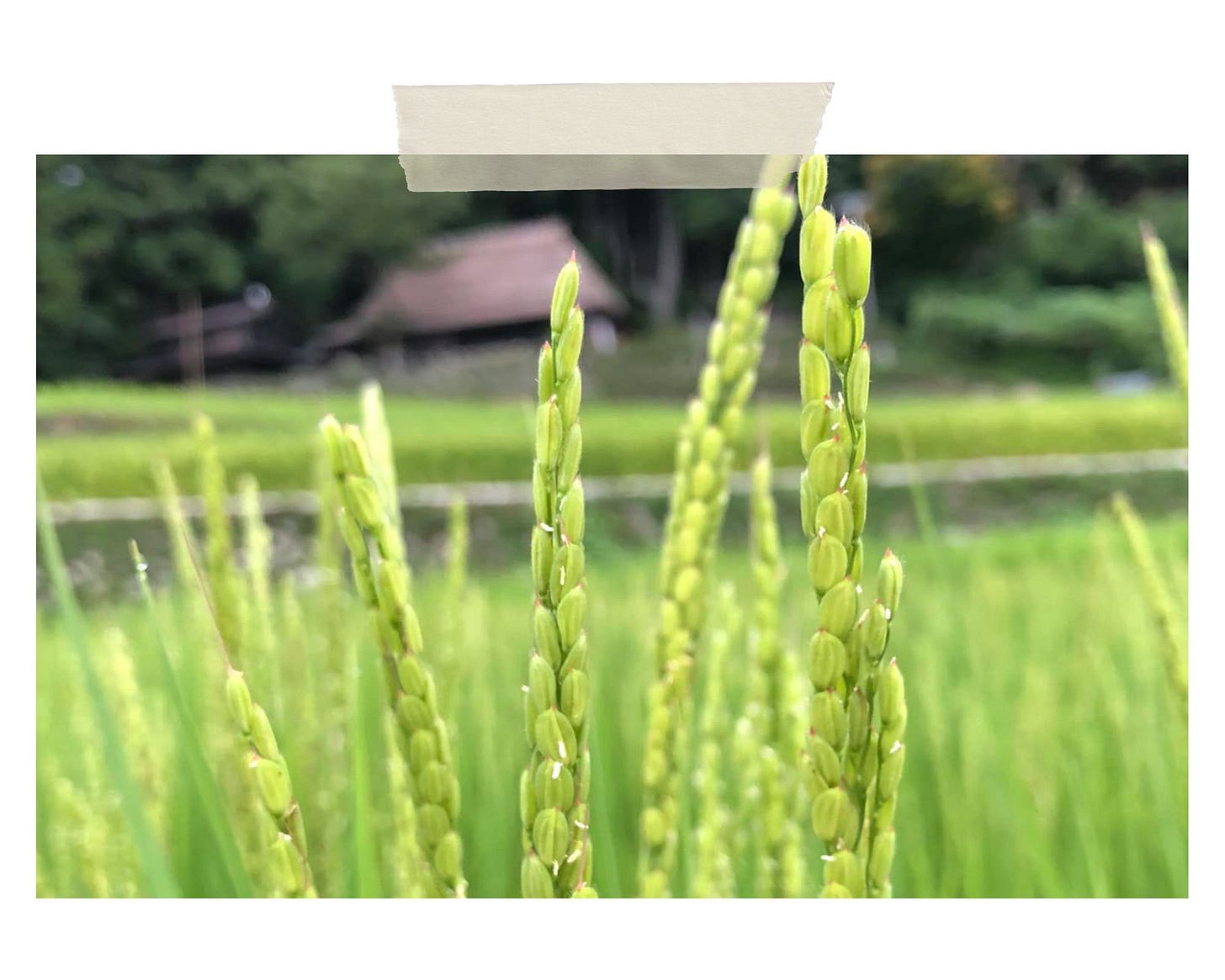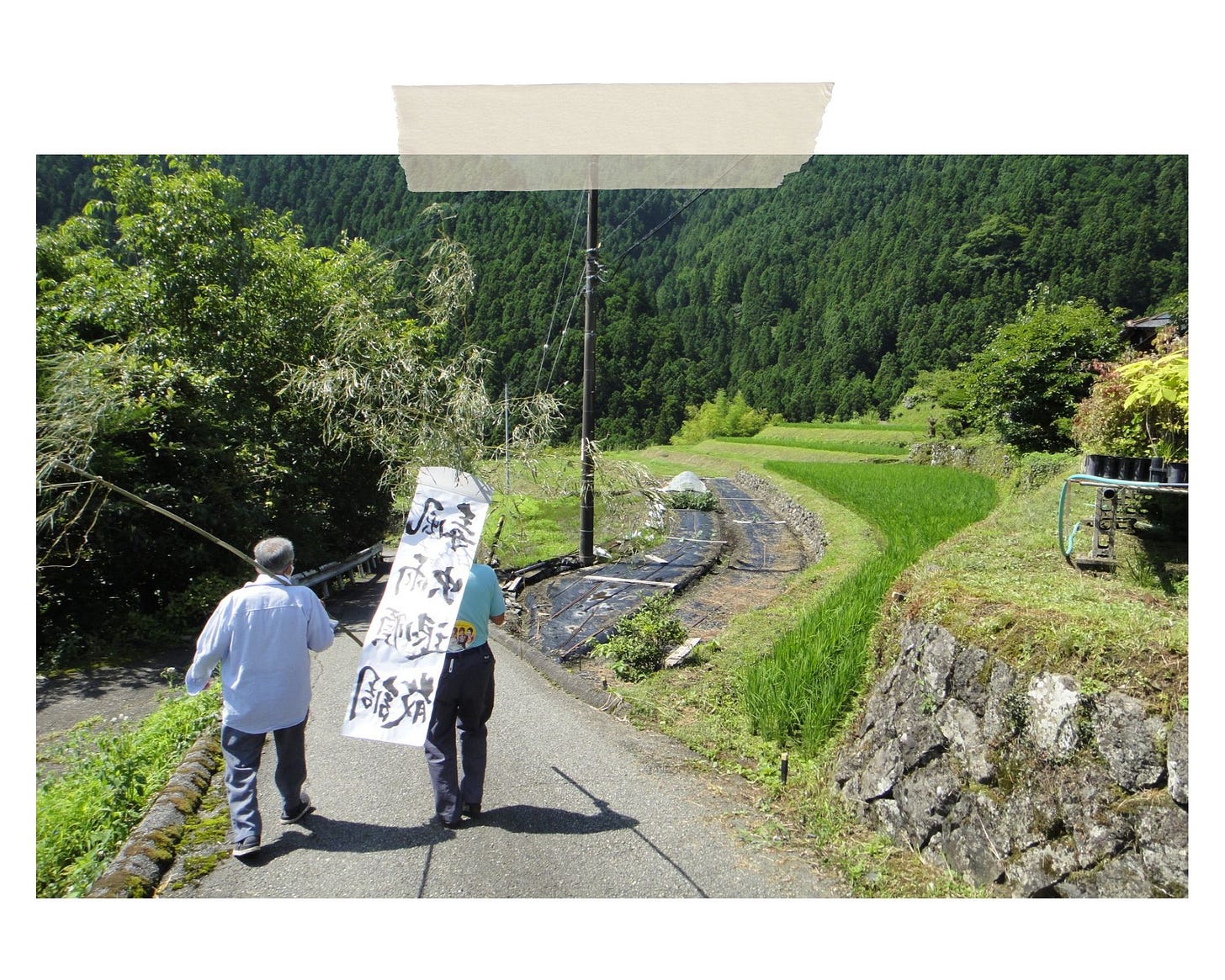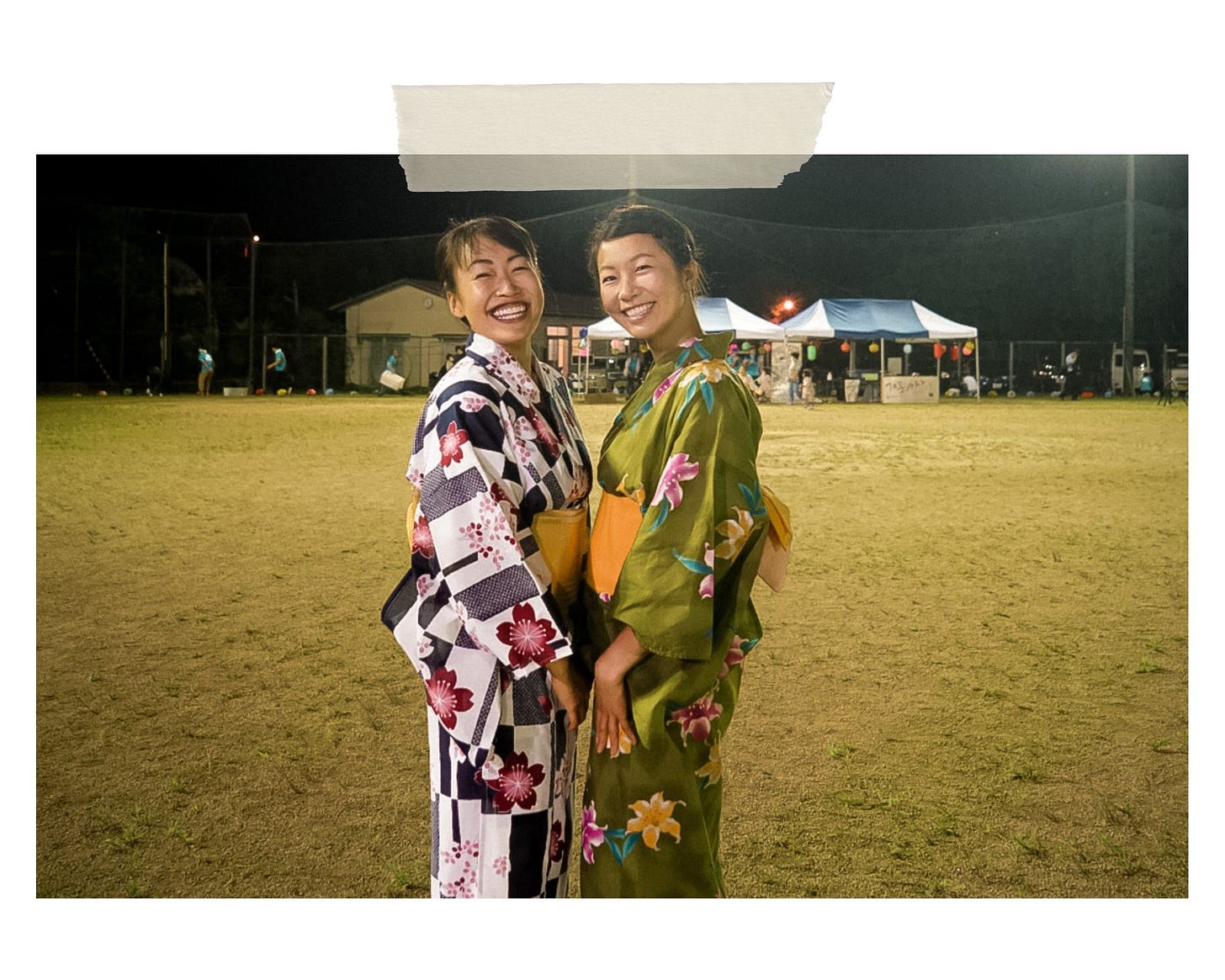Dear friends,
Swelting and sultry days have continued to persist these past weeks in Japan. Although, according to the micro seasonal calendar, we have entered the beginning of autumn. This season is marked as ‘a cool wind blows’ around mid-August. The hints of a change in season are ever so subtle—a gentler sun at sunset, a crescendo of cicadas at dusk, and the air, when night falls, suggests that perhaps (finally) the heat is progressing.
I’ve also noticed the seasonal change by observing the rice fields, which have turned from a vibrant green to a slightly tinted yellow. It’s as if someone brushed a soft-coloured yellow paintbrush over the tops of the grasses.
In spite of the small indications of a seasonal change, it’s still very hot. Nothing cozy about this weather yet. I’m thankful for the mountains and canopy of forest that provide ample shade during the day. I’m thankful for the cool flowing rivers that run through Kamikatsu. Spending time along the river is a quintessential summer activity for many Japanese. Many people from cities grew up taking getaways to more natural places or returning to their hometowns that are closer to nature. Memories playing in and along the river are born and revisited. Summer feels like a time to bask in cold water and nostalgia of carefree days past.
Prayer for a good harvest
In the past, people always lived within the cycle of agriculture, repeating cycles of planting and harvesting over and over again. Festivals were in sync with these practices—wishes for good crops, a celebration of a good yield, or prayers for strength, health, and energy to endure harsh weather.
While there are many large festivals across Japan in summer, there was a local, community ceremony in Kamikatsu called ‘Insect Prayer’ (虫祈祷). Held on July 20, the first day of summer, this ritual is a local and annual tradition to drive away insects that eat the rice.
Sheets of white ofuda (お札) are prepared with words that read “may wind and rain be good”, “poisonous insects be gone”, “good harvest” and others. Monks and villagers in the community recite chants and tie the ofuda to a bamboo rod and take a walk to a nearby river while continuing the chanting. It’s these kinds of festivals that I hope to carry on each year—there is something very honest and intentional, almost in reverence or fear to the gods, to carry out the ritual.
I am also praying for a wonderful (first) rice harvest this year!
Celebrating our ancestors
All across Japan now is the time of the year to honor the ancestors. Obon is about reuniting with family and welcoming the souls of the dead. The history of Obon dates back a long, long time and various prefectures and regions celebrate it differently. A variety of traditions and customs have developed over time in the form of rituals, festivals, and dances.
I grew up without knowing much about my ancestral heritage or honoring the generations that came long before me. I grew up in an ocean apart from my grandparents and almost all my relatives, so it was hard to contextualize or understand these rituals. I do remember as a child when I visited Japan and Hong Kong, I would light incense and put food offerings in front of familial tombstones. In a way, that is what Obon is about—a returning, an honoring, and an offering.
Over time and presently, Obon is regarded as a holiday. Some Japanese take the trip to visit their families, but many just take these few days off as a break from work. Many young people see this time as a chance to wear yukata (a summer kimono) often worn at summer matsuri (festival).
Bonodori (盆踊り) is a dance to welcome the souls of the ancestors. Every region has a different dance, accompanied by a unique ensemble of instruments, that creates this connection between human and spirit. One of the most famous versions of the bonodori is Tokushima’s Awa Odori (阿波踊り). Tokushima pride!
Awa Odori
After a two-year hiatus due to COVID-19, the Awa Odori finally returned to Tokushima this year. Tokushima, the prefecture where the village of Kamikatsu is located, is not well-known for many things (unfortunately)… except Awa Odori.
Most of downtown Tokushima is closed and there are parades and dances throughout the streets. Troupes of dances called ren, dawn traditional clothes and move to the sound of Japanese instruments like the taiko (drums), flutes, and shamisen (a plucked instrument with 3 strings). There is a men’s dance (男踊り) and a women’s dance (女踊り)—each completely mesmerizing in a different way. Each ren takes the traditional dance and interprets it in a different way, making the streams of different performances very engaging.
The lyrics that are used during the performance loosely translate to “the dancers are fools and the watchers are fools; if both are fools, you may as well dance”. Wandering the streets alongside the dancers (and dancing myself), I was drawn in by a collective energy of joy and celebration. To take part in the tradition Awa Odori is a living way to connect with the past.
Birthday
It was recently my birthday! And this year I’m grateful to be here, alive, with you;
to have health,
to eat and grow nourishing food,
to have companionship,
to be surrounded by laughter,
to understand love through friends and community.
to love and be loved.
I’m grateful for another year on this beautiful, mysterious, awe-inspiring planet.
Thank you so much for your support and love on this writing project to share about my daily life in Kamikatsu. I am really lucky to have you, near and far.
An extra special thank you to Ben Yeoh, who graciously took the time to interview me for his Substack and podcast. I tend to fumble over words when I have to speak, often preferring the contemplative time writing allows me, but Ben’s interview made me feel at ease. Thank you, Ben!
Check it out! I love that Ben makes the podcast as accessible as possible—if you’re hard of hearing or prefer to read the transcript, those are all available on the website.
Have a calm week ahead. Be gentle and attune yourself to joy!
Take care,
Kana












I happened to read an article about your lifestyle at Kamikatsu in Tokushima where l lived for about five years. I moved to Tokyo and have been spending busy days for one year. I’m really pleased leading your full time there and looking forward to reading your letters from now on. Thank you!
I remember being taught a little obon dance and song. It was simple but it was about the Tenjin Matsuri. Lyrics were just “Tenjin Matsuri, natsu natsu ya, soo soo.” I can still hear the music and clapping in my mind.
So many great memories! I miss Japan and “semi no koe.” Thank you for this reminder.